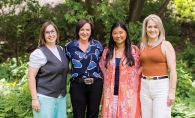Gone are the days of the neighborhood school being the only educational choice, which presents parents with that wonderfully terrifying task of picking an institution that will best serve their family’s education values. While we Woodbury residents are fortunate to have great schools all around, we also have a gem—for those inclined toward math and science—right here in town. It’s the Math and Science Academy (MSA).
MSA is a charter school, which means it is a tuition-free, public school designated for a particular education focus, in this case an emphasis on math and science. It is also an independent school district, not part of District 833/South Washington County Schools. “Charter schools are funded the same way as public schools; however, they do not receive local levy funding,” says Bob Kreischer, executive director of MSA. “The school is run by a board of teachers, parents and community members that sets policy for the school, which means we can make decisions anytime.” In his second year leading MSA, Kreischer is also one of the two founders of Mounds Park Academy in St. Paul.
With approximately 421 students in grades 6–12, MSA has an average class size of 20. Anyone can enroll; there is no admissions test to take. Applications received during the application period become part of a lottery process, if one is necessary, to determine acceptance and waiting lists.
Although it is not a requirement to attend, students who attend are fairly gifted in math and science. They take all the same classes as other schools, in English, math, social studies, science, and the school also requires six years of Spanish. There are electives such as music and art. But at MSA, students can take geographic information system, forensic science, microbiology, anatomy, electronics, rocketry, A Slice of Pi (the school paper) and Lego robotics. After school activities include student council, yearbook, chess club, basketball and track.Another unique requirement is that students must take and pass a calculus class in order to graduate. MSA students also excel in other areas. “We have exceptional MCA scores in writing and reading for our 9th graders, with 100 percent proficient and exceeding standards on both tests,” Kreischer says.
Founded in 1999, MSA has seen tremendous growth, and recently added a new building to better accommodate needs. “We are full to the brim in both buildings,” Kreischer says. “We added more classrooms, a gym and a stage, and an adequate facility for music and a lunchroom. We have a seven-period day and there are only three times all day that one classroom is open.”
One of MSA’s challenges was a large number of students opting for part or full-time Post Secondary Education Opportunities (PSEO), leaving fewer 11th and 12th graders on campus. To help, Kreischer offered more Advanced Placement courses and increased the number of electives, such as an innovative 3D design lab that allows students to design and construct models out of plastic. The result has been a steady increase in attraction and retention of MSA’s high school students.
Cheri Howe is in her 10th year teaching at MSA and can appreciate first-hand the benefits of a charter school. “I specifically sought out a teaching position with a charter school because its structure encourages the whole community—teachers, students, parents, and the school district—to work together to manage and lead our school,” Howe says. “My sons had attended an elementary school where I experienced this as a parent and saw the positive impact it had on the school. And that has been true about MSA. I’m passionate about what I teach and appreciate the autonomy I have to design and quickly make changes to my curriculum to meet student needs.”
Whether it’s finding a place to fit in or finding the right environment to suit a learning style, MSA is a great option for parents like Deb Ledvina of South Maplewood, who was looking for a school for her son. “I am one of those parents who thoroughly researched every step of where my children were attending from daycare on,” Ledvina says. “My son is honestly a computer nerd. He was in a Catholic school that was good, but we recognized the need for a smaller environment that was primarily academic focused.”
“I have been beyond impressed with the caliber and dedication of teachers at MSA,” Ledvina says. “They take one-on-one time with students who need it, demand good classroom behavior, and really focus on preparing students with life skills. A parent couldn’t ask for more.”
Ledvina says that MSA also has a great inclusive culture. Paul Johnson, a senior, agrees. “I love MSA's close-knit community,” Johnson says. “I know and have had classes with all 23 of my fellow seniors. Everyone knows and at least respects everyone else.”
After graduation, Johnson plans to go through medical school and become an orthopedic surgeon to develop cheaper and more functional robotic hand prosthetics that can respond to stimuli from the brain. “I love the idea of getting to help people in a tangible and lasting way that improves living conditions for generations to come,” he says.
Parents who are looking to make the decision on the best place for their children’s education surely have a major decision that requires extra thought. What is Kreischer’s expert advice? “I urge parents to visit schools while kids are in the school. Ask questions about the academic emphasis. What do they do about kids who don’t follow the rules? Many parents pick a charter school because they think is safer and kids will have more individualized attention, which can be a misnomer. It’s important to think about the academic model and how your child learns. And it’s important to look at several schools.”
Parents who have more interest in MSA should contact the school for a tour. 8430 Woodbury Crossing; 651.578.7507.









